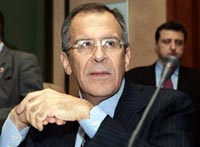FM says Russia won't seek to dump CFE treaty at Vienna conference
Foreign Minister Sergey Lavrov said Wednesday that Russia will not seek to abandon the Conventional Forces in Europe treaty when a conference of treaty signatories is held next week in Vienna, Russian news agencies reported.

Russia last month called for the emergency conference amid increasing friction between Moscow and NATO. President Vladimir Putin in April called for a moratorium on Russia's observing the treaty and said Russia could dump the pact altogether.
"The question of Russia's leaving the treaty won't be raised" at the Vienna conference, Lavrov was quoted as saying by the ITAR-Tass, Interfax and RIA-Novosti news agencies.
The treaty establishes limitations on countries' deployment of tanks, armored combat vehicles, artillery, attack helicopters and combat aircraft. It was signed in 1990 and amended in 1999 to reflect changes since the breakup of the Soviet Union; Russia has ratified the amended version but the United States and other NATO members have not.
The Western countries that have not ratified the amended version say they won't do so until Russia withdraws its troops from the former Soviet republics of Moldova and Georgia.
Lavrov called those demands "artificial ties" and said Russia called the conference "to be a forum where we will put forward our concerns," ITAR-Tass reported.
The dispute over the CFE, which is seen as a key element in maintaining stability in Europe, comes as Russia and the United States spar over a U.S. proposal to place elements of a missile defense system in the former Soviet satellite countries of Poland and the Czech Republic.
Washington says the plan is aimed at intercepting possible missile strikes from rogue states such as Iran and North Korea, but Russia says such attacks are virtually impossible and claims the proposed system is aimed at weakening Russia's missile capabilities. The issue is likely to be a key source of tension at the Group of Eight summit this week in Germany, which includes Putin and U.S. President George W. Bush.
Lavrov said Russia was ready for further discussions, but apparently held to Moscow's dismissal of the purported threat of missile attacks.
"When we are convinced that (the system) is not aimed against us but against Iran and North Korea, we are ready to sit at the negotiating table and discuss the reality of such threats - professionally, without propaganda, without the presence of the press, at the level of military specialists with globes and compasses in their hands," Lavrov said, according to ITAR-Tass.
Subscribe to Pravda.Ru Telegram channel, Facebook, RSS!


